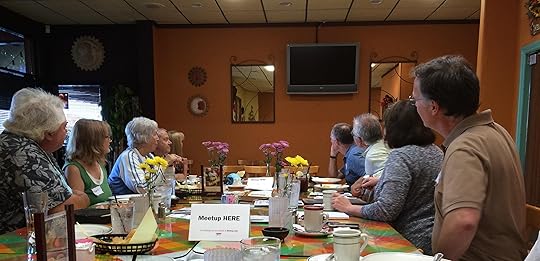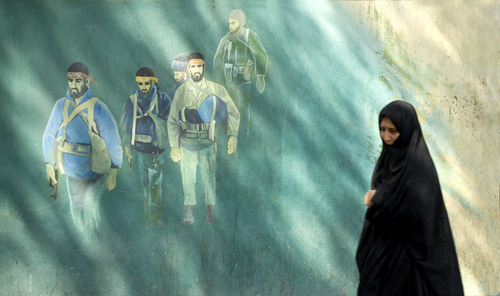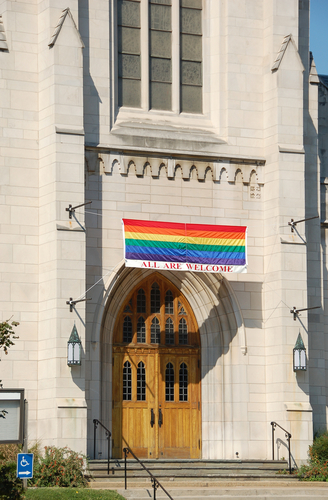Hemant Mehta's Blog, page 1902
October 14, 2014
Jewish Students Lead Charge to Remove Jewish Religious Symbol from a Wisconsin High School
A sukkah is a hut covered by things like palm leaves built for the Jewish festival of Sukkot.
Some Jewish students at Nicolet High School in Wisconsin built one recently and they wanted to keep it in the school’s courtyard… but you can see the problem with that: it’d be a religious display on government property, akin to Christian students putting up a Nativity scene at the school.
What’s really interesting, though, is that it was fellow Jewish students who led the charge to have it removed:
“The prevailing view in the Jewish community is for a strong line between religion and government,” said Elana Kahn-Oren, a Nicolet parent and executive director of the Milwaukee Jewish Federation’s Jewish Community Relation’s Council, who approached Nicolet Principal Greg Kabara on behalf of the group.
“We really value the separation of church and state. And we recognize that it protects us and all religious minorities,” she said.
…
Though it was adults who raised their concerns with Kabara, the reservations appear to have percolated up from the students themselves.
Good for those students to raise the issue. Conservative Christians could learn a lesson from them. Pushing for church/state separation isn’t anti-religious in the least — it’s best for everybody.
(Image via Shutterstock. Thanks to Richard for the link)
Another Georgia County Approves Display of “Historically Significant Documents”… Including the Ten Commandments
The Newton County Board of Commissioners in Georgia just approved a display of nine “historically significant documents” to be placed in the local courthouse.
And, as alert readers know by now, that’s really just a code for Let’s get the Ten Commandments up in city buildings… and we’ll just surround it with other shit so no one can sue us.
In fact, the Ten Commandments display, along with another about the phrase “In God We Trust,” are really the only two that have no historical significance at all. It’s not like our laws derive from them. Hell, only two of the Commandments are legally forbidden — and it’s not like that’s the case because they were written in the Bible.
[Pastor of Berean Baptist Church Tom] Rush said the replicas were purchased through donations from Newton County citizens.
“There is no cost to Newton County,” he said. “They will also pay for the cost of installation, if that is necessary.”
More code words. By “Newton County citizens,” he means “Christians.”
The group sponsoring these displays, by the way, is called “Ten Commandments Georgia“…. in case there was any doubt about the true intentions here.
The group exists to:
… acknowledge God through knowing, obeying, and displaying the Ten Commandments thereby, restoring a common moral code based upon God’s laws and the founding philosophy of our country.
And their ultimate goal?
Our all encompassing goal is to see in our day a restoration of a common moral code based upon God’s laws, The Ten Commandments. A restoration that will make our families happier, our neighborhood safer, and our government more just.
They want a theocracy. And since they can’t legally do that, they’ll pretend that their religious commandments are somehow part of American legal history through these displays. Because keeping the Sabbath Day holy holds the same weight as the Magna Carta and the Declaration of Independence.
(Thanks to Brian for the link)
Meet Physicist Stronzo Bestiale, an Asshole If There (N)ever Was One
Stronzo Bestiale is a researcher at the Institute for Experimental Physics in Vienna who is a co-author on a small number of major scientific papers. His work has appeared in peer-reviewed publications that include the Journal of Statistical Physics and The Journal of Chemical Physics.
He’s also a figment of someone’s imagination, which becomes evident when you learn that Stronzo Bestiale, in Italian, means Total Turd, Asshole Beast, or Complete Asshole, depending on whom you ask.
The man who breathed life into this Asshole (sorry for that image) is a retired scientist, William G. Hoover, who was formerly employed at Lawrence Livermore National Laboratory. A writer named Vito Tartamella (whose name, I sincerely hope, doesn’t mean “Blithering Buttwipe”) finally noticed how unlikely the Stronzo name is and got in touch with Hoover to ask about it.
 Hoover gamely explained that back in the eighties, he occasionally had a hard time getting his research papers published. That was regrettable but not unusual, he said:
Hoover gamely explained that back in the eighties, he occasionally had a hard time getting his research papers published. That was regrettable but not unusual, he said:
New discoveries in science are hard to publish because scientists are rather conservative, as discussed by the epistemologist Thomas Kuhn.
After a couple of rejections, this happened:
While I was traveling on a flight to Paris, next to me were two Italian women who spoke among themselves, saying continually: “Che stronzo (what an asshole)!”, “Stronzo bestiale (total asshole).” Those phrases had stuck in my mind. So … I asked my colleague [Giovanni] Ciccotti [a condensed-matter physicist in Rome] what they meant. When he explained it to me, I thought that Stronzo Bestiale would have been the perfect co-author for a refused publication. So I decided to submit my papers again, simply by changing the title and adding the name of that author.
Somehow, Hoover concluded contentedly, that made a difference, and the papers were accepted for publication.
Tartamella clearly enjoyed learning of – and writing down — that story, but he issues a sincere word of caution, too. The Bestiale episode, he says
… laid bare how vulnerable control systems in the review of scientific research were (and still are!). If you’re able to insert the name of a nonexistent author in a publication, who will guarantee that even the scientific contents have been examined with care?
Very true.
I confess I got a chuckle out of the whole thing, but in the cold light of day I don’t believe that Hoover did anyone any favors with his little joke. Making stuff up is not compatible with the ethos of science; and next to a murder trial or a presidential eulogy, a scientific paper is probably the one platform where scatological levity and juvenile guffawing ought to be avoided.
Two Republican Congressional Candidates Agreed to Meet with Our Atheist Group, but One Was Invisible and Inaudible
As an unfortunate result of California’s Proposition 14, the so-called “top-two primary law,” California Congressional District 25, where I live, can only choose this November between two Republican candidates for our new U.S. Congressperson. No other parties are on the final ballot. They are former State Senator Tony Strickland and current State Senator Steve Knight. This is what they look like:
Our district used to be more Republican-leaning, but it has recently become slightly more Democratic. This means that neither candidate can win unless they court both Republican and Democratic voters.
Rick Wiggins, a member of my local atheist group, the Santa Clarita Atheists and Freethinkers, somewhat whimsically invited both candidates to come to speak to us separately at two of our monthly meetings.
To our astonishment, they both accepted!
Tony Strickland met with us on August 9 at a restaurant where we usually hold our meetings. He was friendly and gracious and we thanked him for the personal and political courage it took to meet with a group of atheists. He gave us a brief self-introduction and we asked him several questions. In general, his views are typical of a mainstream Republican, although he characterizes himself as one who “reaches across the aisle.”
Responding to our questions, he said he would favor having atheist/Humanist chaplains in the military, and he repudiated the anti-science attitude of Congressman Paul “lies from the pit of Hell” Broun, who is still on the House Committee on Science, Space, and Technology (*head slams on desk*).
He gave the standard Republican position on climate change, saying that “scientists still disagree” if it is caused by burning fossil fuels. We pressed upon him that a “scientist” is not the Professor on Gilligan’s Island, the guy who knew everything except how to build a boat. The only scientific opinions that are relevant to climate change are those of climatologists, and their consensus is almost unanimous.
There were a few more questions and we told him a bit about ourselves. I think we were able to impress upon him a few things about atheists:
We are good, decent people with morals.We are well-informed, we pay attention to politics, and we vote.Politicians usually either ignore us, or they insult us when pandering to religious people.Because our numbers are growing faster every year, to continue to ignore or insult us will increasingly be politically unwise.Although it might have been a challenging meeting for Mr. Strickland, I think overall it was a positive experience.
Steve Knight said that he would join us at our next monthly meeting on September 13, but with two days to go, he canceled because of a scheduling conflict. He promised at that time to be there at the following meeting, on October 11. Despite our attempts to confirm this shortly before the meeting, we received no further word.
So 16 of us convened for our meeting, enjoyed socializing and sharing a meal, had some interesting discussions, and waited for Mr. Knight to arrive.
And waited.
And waited.
And he finally did arrive, but he was invisible and inaudible.
Here we are listening to him at the head of the table:
After our meeting with Mr. Strickland, we thought of many more questions we wanted to ask Senator Knight. Here are some of the questions we asked him, and after each are his responses, verbatim:
Since there are only two people to vote for and they are both Republicans, why should I give you my vote?
Senator Knight: “. . . . . . . . .”
Given your support of selling paraphernalia bearing the Confederate flag in California government buildings, can you speak to Lancaster Mayor Parris’ assertion that you recently opposed the display of rainbow flags at the Antelope Valley Fair because people might think they are the “gay flag” and be offended?
Senator Knight: “. . . . . . . . .”
It does not look like your extreme anti-abortion stance reflects general public opinion in this district. As our Congressman, on this issue would you represent the views of the majority of your constituents, or the views of your religion?
Senator Knight: “. . . . . . . . .”
What is your position on the Indiana State Police Trooper who asked a woman he had pulled over for a traffic issue what church she belongs to and if she has accepted Jesus Christ as her savior? Would your opinion be any different if the trooper had been promoting Muslim beliefs?
Senator Knight: “. . . . . . . . .”
In light of the Supreme Court’s Hobby Lobby decision, do you believe that corporations are persons who can have religious beliefs, and can impose those beliefs into policy regarding their employees? What if the heads of the corporation are atheists?
Senator Knight: “. . . . . . . . .”
What is your position on freedom of religion? Do you favor complete governmental neutrality for all religious persuasions, including non-belief? Including your own religion? Do you favor more religious influence coming into laws? What if that religious influence is contrary to your own religious belief?
Senator Knight: “. . . . . . . . .”
What are the actual, tangible benefits of having “In God We Trust” on our money and displayed in government buildings, and what are the actual, tangible benefits of having “under God” inserted into what was the original Pledge of Allegiance? Do you have any empirical evidence to support your opinions on these benefits?
Senator Knight: “. . . . . . . . .”
Do you think that women should receive the same pay for the same work?
Senator Knight: “. . . . . . . . .”
Would you hire a very well qualified person to be on your staff if you knew that he or she is an atheist?
Senator Knight: “. . . . . . . . .”
If legislation came before you regarding such things as climate change, California’s crippling drought, stem cells, women’s reproductive rights, or marriage and adoptive rights for same-sex couples, would you turn to your religious beliefs or to science to guide your vote? If those two things were directly opposed, which would you choose?
Senator Knight: “. . . . . . . . . . . . . . . . . . . . . . . . . . . . . . . . . . . . . . . . . . . . . . . . . . . . . . . . . . . . . . . . . . . . . . . . . . . . . . . . .”
His answers all basically sounded the same, so we weren’t very impressed. He didn’t even say goodbye, and I don’t remember seeing him smile. We haven’t heard from him since.
Many in our group are not happy with either choice between these two candidates, but several of us have suggested that we should publicly endorse Senator Knight, since an endorsement from atheists would probably be the kiss of death.
Blogger Kaveh Mousavi — Now on Patheos — Describes First-Hand What’s It’s Like To Be an Atheist in Iran
Kaveh Mousavi (a pseudonym) is, according to his online bio,
… an atheist ex-Muslim living in Iran, subject to one of the world’s remaining theocracies… He was born at the tenth anniversary of the Islamic Revolution of Iran. He has ditched the Islamic part, but has kept some of the revolutionary spirit.
While he was getting his brand new Patheos blog set up, Kaveh wrote a guest post over at Dan Fincke‘s place, in which he describes what it’s like to be an atheist in Iran. As you can imagine, “picnic” and “walk in the park” aren’t in Kaveh’s lexicon.
It shapes your life maybe more than any other thing about you. If you are not a 12-Imam Shiite, you lose most of the opportunities in life. And if you are not a practicing member of one of the four “official” religions, Islam, Christianity, Judaism, and Zoroastrianism, you officially don’t exist. In the forms you have to fill out to get jobs or register for anything, these options are the only four options. According to the Islamic Republic, you have no right to have jobs, study in universities, open a bank account, or live, unless you belong to one of these four religions.
Atheists are not only absent from the official forms. They’re also absent from the public discourse. It’s not [only] that you are demonized constantly and discriminated against, but also your existence is completely ignored, deliberately ignored. “We are all Muslims”. You hear that sentence more than any other in Iran. In every discussion which touches religion — and being a theocracy it’s almost every discussion — people take great care to remind everyone that yes, everyone, no atheists here, all Muslims.… One has to wonder why, in this society where we are “all Muslims”, Islam needs to be defended on every channel and every book.
In the West, Kaveh says, we cannot imagine how pervasive religion is in Iran.
There’s no street without some religious symbolism. No ritual. No event. No book without “In the Name of Allah, the Merciful, the Compassionate”. No greetings or goodbyes. No bill. No official form. Think of the most secular thing and it’s still religious in Iran. The only secular space I can think of is the privacy of my own room. Being an atheist in Iran means that everything, from the walls and the floors and the streets and the houses, everything tells you “you’re not one of us.” …
Being an ex-Muslim is like giving up your privileges. You were the majority until a day ago, now suddenly you are the most hated minority.
Like Kaveh, I write under a pen name. It’s to protect my livelihood: I run a wedding-photography business, in which I deal with many clients who are religious, and who elect to have Christian or Jewish ceremonies. A certain number of them wouldn’t have hired me if the first thing they’d seen when they Googled my name was pages and pages of Friendly Atheist / Moral Compass blog posts.
Kaveh‘s anonymity, on the other hand, is a little more life-and-death. Literally. No comparison.
Would you announce the fact that you are an atheist? Of course, you can’t — you could be hanged. But how far would you go? Would you tell your family? Friends? No one? Would you come out everywhere except where it’s absolutely dangerous? Would you be a proud traitor, or would you act like the criminal you’re supposed to be, hiding your opinion like a dirty secret? How much would you lie? You have to lie anyway, but it’s a matter of degrees. Would your whole life be a lie?
It’s good to have him join us here at Patheos. He’s already hit the ground running (by defending Bill Maher against charges of anti-Muslim bigotry). Let’s hope he stays safe.
(Image via Shutterstock)
North Carolina Magistrate Refuses to Perform Gay Wedding Because of His “Religious Beliefs”
Yesterday was the first day of legal gay marriage in North Carolina, which means you knew this was going to happen:
William Locklear and his partner showed up at the county courthouse Monday expecting to get married after 31 years together.
The couple didn’t get the chance.
A magistrate turned them away.
“He said, ‘I won’t be performing your marriage because of my religious beliefs,’” Locklear said.
The article never mentions the faith of the magistrate, but would anyone like to take a wild guess…?
The solution here is a no-brainer. This isn’t a church; it’s a government building. If your religion prevents you from doing your job, you need to find a different line of work. (While we’re at it, if your religion supports bigotry, you should look for a different one of those, too.)
It doesn’t even make sense since no one’s asking the magistrate for approval or endorsement of the marriage. It’s someone who just has to read a few words and sign some paperwork. Does the guy also refuse to marry people who have been divorced? Interracial couples? Couples who don’t want to have children?
The unnamed magistrate — and I don’t know why a government official who deems himself above the law should be given the protection of anonymity — hasn’t resigned or been fired yet. For some reason.
Thankfully, the couple found a magistrate happy to perform the ceremony and got married earlier today.
(via Joe. My. God. Image via Shutterstock)
Texas A&M Now Holds University-Supported Prayers Before Football Games
Over the weekend, before Texas A&M lost to Ole Miss, the Aggies held not one, not two, but three separate prayers on the field before kickoff. The first two were led by Student Body President Kyle Kelly. The third was led by Memorial Student Center President Ryan Trantham.
Kelly said the idea originated from the South Carolina game when he noticed how the Gamecocks led a prayer before the game. He said he liked the idea, but didn’t think anything more of it.
The following week, Kelly said he received a phone call from Regent Jim Schwertner, who asked if Kelly had also noticed the gameday prayer.
“Our school has got such time honored traditions and values and I thought why aren’t we doing that?” Schwertner said.
Because it’s illegal, that’s why.
The Supreme Court has said this time and time again: Student-led prayers may be acceptable, but not when the school promotes them and, in this case, actually presses for them to happen.
What’s happening at Texas A&M is school-sanctioned prayer delivered by student government representatives. Even if it’s not sectarian, it sends the message that the school promotes religion over non-religion.
At least one student quoted in the school newspaper understands that:
Katherine Kimball, economics sophomore, said she felt the prayer was unnecessary and was potentially a sensitive issue for those who did not prescribe to any religion.
“If the students wanted to do it on their own or even if the players wanted to do it, it would be different, right?” Kimball said. “Like, it would be personal, but I feel like if they have that one overall prayer that you have to do at the beginning of a football game, it kind of makes it more like A&M doing it. Then it makes it look like a public institution supporting a particular religion, which I disagree with.”
Make no mistake, this isn’t just student-led. This is a prayer that came from the top down:
Kelly said he envisions student leaders leading the gameday prayers, but the process to have a prayer approved was ultimately left to officials within the university system.
“Dr. Mark Hussey is the one who ultimately made the decision to have the prayer here in College Station,” Kelly said. “The Chancellor made the decision for the prayer to be said system-wide at all the other system schools as well.”
I’ve alerted FFRF to the problem. We’ll see if anything comes of it.
By the way, it’s not like the weekend’s prayers helped. The Aggies are on a two-game losing streak after beginning the season 5-0.
Catholic Church In Kenya Opposes Tetanus Vaccinations, Suspecting a Secret Plan to Sterilize Women
As we’ve seen, Muslim fundies are often anti-vaxxers. In places like Pakistan and Afghanistan, they’ve gotten it into their heads that polio-fighting programs are really Western-led campaigns to make Muslims infertile. As a result, terrorist groups have waged a long intimidation campaign against medical teams.
Minus the violence, that same mindset has now taken root in Kenya – courtesy of the Catholic Church, which wants Kenyans to stay away from government-led efforts to eradicate tetanus:
The Catholic Church has opposed a tetanus vaccination campaign scheduled to start next week that targets women between the ages of 19-49 years, claiming it is a secret government plan to sterilize women and control population growth.
The Chairman of the Catholic Health Commission of Kenya, the Rt Rev Paul Kariuki Njiru, and his deputy, the Rt Rev Joseph Mbatia, said the Ministry of Health intends to introduce the campaign in a low-key fashion without a big publicity campaign because they [the health workers] know they are up to no good… “Why should [the campaign] target women between the ages of 19-49 years; why has it left out young girls, boys and men if they are all prone to tetanus?”… the two asked at a press conference at St Patrick’s Pastoral Centre in Kabula, Bungoma County.
It’s a perfectly good question, and Kenyan health authorities have a perfectly good answer:
Tetanus is among the most common, lethal consequences of unclean deliveries and umbilical cord care practices, and has a 100 per cent death rate if not treated. [Kenya's Head of Vaccine and Immunization Services Ephantus] Maree said Kenya is among the 28 countries in the world that have not eliminated tetanus since the WHO in 1989 called for its elimination by 1995. “In fact, we are lagging behind. We give the vaccine to women aged 14-49 because they are in the child-bearing age.”
Bishop Mbatia doesn’t believe it, claiming — without any apparent evidence that passes muster — that the vaccine has been administered in the Philippines, Nicaragua, and Mexico to prevent women from ever getting pregnant again.
The Kenyan Catholic Church is now using its considerable influence to thwart the anti-tetanus campaign. The BBC reports that
Catholic priests have been telling their congregations to boycott a campaign that begins on Monday to vaccinate women against tetanus. Some 40% of Kenyans are Catholics, and the Church warning could deter many women from getting vaccinated.
It beggars belief that these men think that one day they’ll get high-fives from their Maker despite the death and suffering they willfully created.
(Image via Shutterstock. Thanks to Joe for the link)
The Benefit of Long-Form Conversations
Last night, Sam Harris appeared on CNN to talk about his criticism of Islam with anchor Don Lemon:
It comes several days after an even longer interview with MSNBC’s Lawrence O’Donnell in which he made some of the same points:
I wanted to set aside the substance for a moment to make a simple point:
In both cases, Harris was given the chance to make his case (or defend himself against accusations) and I thought it made for a much better conversation.
It’s easy to vilify someone for a comment made during a heated argument when everyone has to work in short phrases and sound bites. You’re so eager to say anything that you end up saying something you later regret and that distracts from your larger point. Having done those kinds of interviews before (including on Fox News Channel), I do my best to prepare in advance, to make sure that I have short to-the-point statements ready to go in case the host keeps cutting me off. But those conversations rarely go according to plan no matter how much you prepare.
The same thing happens on Twitter, where brief comments made in haste (or without editorial oversight) are ripe for critics to interpret in the worst possible way. And it’s not like they’re always wrong. When you have to condense complex ideas into a single sentence, a lot of the meaning will get lost along the way.
I’m much more likely to listen to critiques of Harris or Richard Dawkins or anyone else when people are criticizing positions they actually hold. And not every statement they make in the heat of the moment, or on Twitter, or in a brief quotation in someone else’s article represents their views fully or accurately.
Whenever I see a takedown of someone like Harris, even if they’re claiming to quote him, my rule of thumb is this: If I were to ask Harris if he actually holds those views, would he say yes? If the answer is no, then it’s not fair criticism. It’s a straw man.
Sounds obvious, but I’ve seen plenty of awful, untrue things said online about me, friends of mine, acquaintances, and other people I respect. Speaking for myself, people will claim I believe X or Y because of something I said or did, perhaps ignorantly or inadvertently but not maliciously, yet none of those people bother to flat-out ask me if I hold those views. If they did, I would be able to set the record straight. And maybe that’s why they don’t ask — because they’re looking for someone to trash and the truth would ruin their narrative.
Even more importantly, though, if you’re trying to change someone’s mind, misrepresenting his or her views to begin with is the quickest way to shut down the conversation for good. It’s completely ineffective… though it’ll undoubtedly boost the critic’s self-esteem.
In the interviews above, to a large extent, Harris had the chance to make his case in a way he couldn’t on Fox News (where the hosts would never let him speak fully) or even Bill Maher‘s show (where too many people are trying to chime in at once). That’s why I’m a fan of shows hosted by Charlie Rose and Terry Gross and Marc Maron — because they give their guests plenty of time to speak without interruption and you get to learn what they really believe. Their shows are far more interesting than ones where everyone is talking over each other or guests only have a couple of minutes (if that) to make their points.
I also appreciate that those shows aren’t debates, where both sides are trying to one-up the other. The goal is to figure out how the guests think, not to use every opportunity to pick apart why they’re wrong. I see plenty of the latter already; we could use more of the former.
Vatican Report on Gays and Lesbians is Neither “Stunning” nor “Revolutionary”
A report released this week by the Vatican is being heralded as “revolutionary” for its modern take on homosexuality, cohabitation, and other topics the Church hasn’t taken kindly to in the past.
Whether it actually is revolutionary is another story altogether.
The report was borne out of a two-week meeting of Catholic bishops focusing on family issues (which Sara Lin Wilde wrote about here). While stopping short of endorsing same-sex relationships, it acknowledges that LGBT people do have “gifts and qualities” to offer to Christians and ponders whether Catholics should consider opening their arms to their gay and lesbian brothers and sisters:
Homosexuals have gifts and qualities to offer to the Christian community. Are we capable of welcoming these people, guaranteeing to them a fraternal space in our communities? Often they wish to encounter a church that offers them a welcoming home. Are our communities capable of providing that, accepting and valuing their sexual orientation, without compromising Catholic doctrine on the family and matrimony?
The document acknowledges that increasing attention toward LGBT issues has become a problem for the Church (ya think?) and that they still don’t support marriage equality:
The question of homosexuality leads to a serious reflection on how to elaborate realistic paths of affective growth and human and evangelical maturity integrating the sexual dimension: it appears therefore as an important educative challenge. The Church furthermore affirms that unions between people of the same sex cannot be considered on the same footing as matrimony between man and woman. Nor is it acceptable that pressure be brought to bear on pastors or that international bodies make financial aid dependent on the introduction of regulations inspired by gender ideology.
Still, it takes a big step by saying that plenty of same-sex couples are raising kids and that those kids’ needs should take precedence over all else. It’s almost suggesting that kids do just fine with two moms or two dads — but doesn’t actually say so.
Without denying the moral problems connected to homosexual unions it has to be noted that there are cases in which mutual aid to the point of sacrifice constitutes a precious support in the life of the partners. Furthermore, the Church pays special attention to the children who live with couples of the same sex, emphasizing that the needs and rights of the little ones must always be given priority.
The document also upholds the Church’s stance against birth control and deems cohabitation “not ideal,” but containing some “constructive elements.” It also suggests that there might be a way to allow divorced and perhaps even remarried Catholics to receive communion, another issue that has caused major contention in the Catholic world. Over at the New Yorker, Alexander Stille wrote that merely addressing today’s “modern families” with bishops was a bold move for Pope Francis, let alone coming to the conclusions the group did:
In calling for a synod on the family, Francis followed a precedent set by John Paul II in 1980. But this new gathering has a very different tone. John Paul made it clear that he would brook no dissent on the Church’s teachings regarding sexuality and family life, while Pope Francis has given the impression that all subjects are open — at least for discussion. “The Lord asks of us a renewed openness,” Francis said, in a homily in Saint Peter’s basilica on the eve of the synod. “He asks us not to close off dialogue and encounter but to gather everything that is valid and positive, even by those who think differently from ourselves and adopt different positions.”
With regards to the “gays might be okay” section of the document, some conservative Catholic groups are already upset, while leaders of progressive groups are thoroughly pleased:
“Overall I am very excited by this news,” said Francis DeBernardo, executive director of New Ways Ministry, an LGBT-friendly Catholic ministry in Mount Rainier, Md., told the Washington Blade on Monday. “It’s really a total reversal of the attitude and approach the church leaders have taken regarding lesbian and gay people for decades now.”
Marianne Duddy-Burke, executive director of Dignity USA, an LGBT Catholic group, described the document as “surprisingly positive.”
“For the first time the Vatican has said something positive about same-sex couples,” she told the Blade. “Sort of acknowledging they’re could be mutuality and sacrifice in the commitments that we make to one another, that is a tremendous step forward.”
Maybe the most quote-worthy reaction came from the Rev. James Martin, an author and priest who called the report “revolutionary” in a Facebook post:
“This is a stunning change in the way that the Catholic Church speaks about gay people.”
“The synod said that gay people have ‘gifts and talents to offer the Christian community.’ This is something that even a few years ago would have been unthinkable.”
Yes, this is more tolerant language than we’ve heard from the Vatican previously, and it’s pretty well aligned with other statements the “progressive Pope” has made on homosexuality so far. I can appreciate that.
But, as the New York Times put it, this doesn’t change Church doctrine or teaching. When it comes down to it, the Catechism still refers to gays as “intrinsically disordered” and demands gays be chaste. There is no call to action here ordering churches to start welcoming LGBT people or calling on priests to marry same-sex couples. Rhetorical questions about compassion and vague statements suggesting that “gays are people too” do not amount to sweeping change.
This Vatican statement contains a lot of nice words, and that will certainly make some Catholics feel better about belonging to a historically homophobic institution. But when it comes down to it, they’re just words — and they don’t help the actual LGBT Catholics who suffer at the expense of bigoted doctrine. We’ll need a lot more from the Church before we can consider this a “total reversal” in Catholic attitude.
(Image via Shutterstock. Thanks to Shane for the link)
Hemant Mehta's Blog
- Hemant Mehta's profile
- 38 followers













